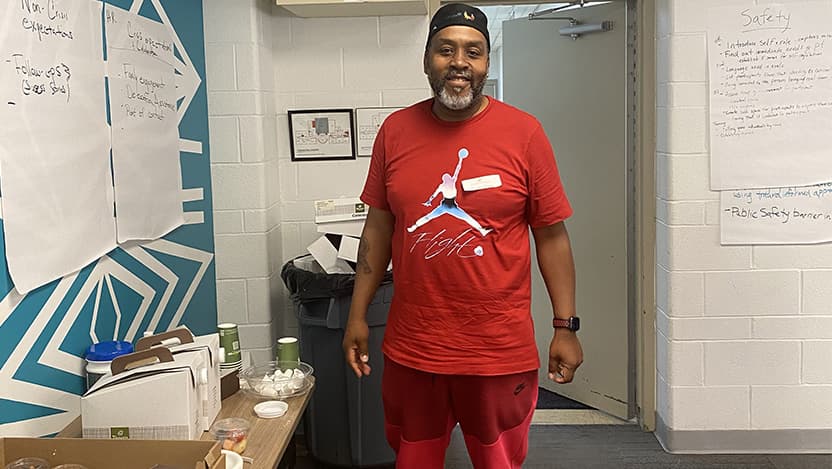To help patients, UChicago Medicine’s trauma center staff and street outreach workers find ‘a-ha’ moments

Staff at the trauma recovery programs of the University of Chicago Medicine and Advocate Health Care work toward the same mission as community street outreach workers: caring for violently injured patients and their families and preventing future violence.
However, their daily responsibilities differ greatly, making effective collaboration a challenge despite a shared goal.
To help bridge this gap, more than 60 attendees — split between hospital response staff and street outreach workers — attended two four-day workshops this summer to learn about each group's roles and responsibilities. Participants shared the strategies and resources to address their common cause.
The workshop was curated and presented by Southland RISE (Resilience Initiative to Strengthen and Empower), a collaborative of UChicago Medicine and Advocate Health Care dedicated to strengthening the violence recovery ecosystem on Chicago’s South Side and in the South suburbs.
The trainings were hosted and co-facilitated by Communities Partnering 4 Peace (CP4P) network.
“This was the first time these groups have come together at this scale, and it was exciting to see those ‘a-ha’ moments, with participants realizing they have a lot in common,” said Anita Chávez-Berry, senior program coordinator for Southland RISE.
Launched jointly by trauma recovery programs at UChicago Medicine and Advocate Health Care, Southland RISE has awarded $650,000 to more than 50 community-based programs over the past five years. This partnership forges collaborations to end gun and intentional violence and promote trauma recovery and health equity on the South Side.
Through its Urban Health Initiative, UChicago Medicine’s Violence Recovery Program (VRP) offers trauma victims and their families wraparound care, providing violence recovery services to support mental, emotional and physical healing.
“The ecosystem of support needed for violently injured patients involves more than just hospital-based work,” said Franklin Cosey-Gay, MPH, PhD, director of UChicago Medicine’s VRP. “It involves partnerships with the communities and residents we serve.”
Hospital response staff and street outreach workers play a vital role in every patient’s recovery, even after patients leave the hospital. The Southland RISE trainings — designed to enhance understanding and collaboration between these teams — are a critical step in improving support for victims and their families. Both groups are needed to get patients on a path to physical and emotional well-being and to prevent reinjury.
During the workshop, hospital response training facilitators illustrated the first crucial minutes after a trauma patient is admitted. The objective: to give street outreach workers an inside view of how healthcare workers communicate with patients and their families, from the moment someone enters the trauma center to their release.
In most cases, street outreach workers are dispatched to the trauma center after a violent injury occurs in their neighborhood. They then provide support and resources following a patient’s discharge.
While meeting with hospital response teams, outreach workers shared how they build relationships within their communities to prevent violence and resolve conflicts.
“I’m part of a team of five advocates who patrol the North Lawndale neighborhood 24 hours a day,” said Henry Merrill, a victims advocate for UCAN, an organization focused on high-risk youths.
“Once we’re assigned to a patient, we use a collaborative approach to identify resources for them and their families that range from grief counseling or therapy to housing, food and clothing assistance. We may work with a family for one month or a year," Merrill said.
As part of the workshop, Metropolitan Peace Initiatives staff facilitated community-building activities and discussed strengths and weaknesses in communication and leadership styles. These points demonstrated the importance of diverse recovery teams.
Due to high demand from hospital staff and street outreach workers, Southland RISE offered additional workshops in the fall. By late October, 120 street outreach workers and hospital staff completed the training. Additional trainings are planned for February 2024.
“Understanding each other’s workflows is very important,” Cosey-Gay said. “Ultimately, we want survivors and their families to see us all as a collaboration around their recovery and their path toward living a more meaningful life in terms of protection from violence.”
People injured through violence suffer from trauma, as do their families. Victims are five to seven times more likely to be hurt again — or to hurt someone else — through violence.
To interrupt this cycle, Southland RISE and the trauma recovery teams at UChicago Medicine and Advocate work with community partners that specialize in violence prevention and trauma recovery at the neighborhood level.
In 2022, the VRP engaged more than 1,700 patients. The same year, Advocate’s Trauma Recovery Centers engaged more than 1,500 patients.
“We want to provide survivors of violent injuries with sustained support until they are able to heal and get out of the violence cycle,” Chávez-Berry said.
“This can only be accomplished by building relationships and working together on violence prevention — as well as providing resources and support for post-injury healing — to help ensure patients don’t end up back in the emergency department.”
Southland RISE was inspired by U.S. Sen. Dick Durbin’s Chicago HEAL Initiative (Hospital Engagement, Action and Leadership), which encourages Chicagoland’s healthcare providers to help reduce community violence and address healthcare needs associated with violence recovery.
